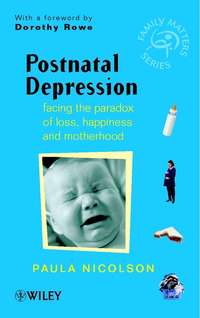
Полная версия
Dorothy Rowe’s Guide to Life
If your feeling about yourself is in the bottom half of the dimension you do feel threatened personally by such events. You deplore the stupidity, immorality and greed of the persons who brought these events into being, but all this only supports more strongly your conclusion that the world is a wicked, evil place and that all the future holds for you is despair, doom and disaster.
The better you feel about yourself, the better the world and the future look.
The worse you feel about yourself, the worse the world and the future look.
If you don’t understand how your decisions and your interpretations are influenced by how you feel about yourself, you will, like those people who suffer from the delusion of intellectualization, think that you are making decisions and interpretations on purely objective grounds when in fact you are not.
If you don’t realize that how you feel about yourself is an interpretation and instead think that your feeling of badness and unacceptability is an irrefutable fact of the universe, a part of the natural law, you will always feel trapped and miserable, no matter what good fortune comes your way.
If you do realize that how you feel about yourself is an interpretation you know that when good fortune eludes you or friends betray you or you make mistakes you are free to create whatever interpretation suits you best. Be miserable if you want, or lay the blame on others, feel guilty and vow to improve, enjoy the comfort of self-pity, or tell yourself that things are bound to get better.
You are free to choose.
Choosing to change how you feel about yourself and actually changing can be very easy. It can also be very difficult for three important reasons.
The first reason has to do with our relationships with other people.
Suppose you’re one of those nice, quiet, amenable people who never disagrees with anyone and who always fits in with what other people want. You do this because you think that this is what being a good person means, but as a result other people use you and trample over you. At work you get the jobs no one else wants and at home the family take you for granted. So you decide to change.
You make a very big change. You give up judging yourself on a ‘good/bad’ dimension and choose a ‘making the most of my life’ dimension. From now on all your decisions will be based on what you need to make your life satisfactory. You will still continue to be kind, caring and helpful when you feel it is appropriate but you will no longer be at everyone’s beck and call. You state your needs and where necessary you criticize and argue. You now feel much happier.
Are your friends and family pleased with your change?
Not for a minute.
If you change they have to change. They have to see you differently. They have to behave differently towards you. They don’t mind you being happy but not at their expense.
So they decide to push you right back where you were.
Just how they try to do this can range from violence (‘She answered back so I hit her’) through guilt (‘I never thought I’d see the day when you wouldn’t take care of your mother after all I’ve done for you’) to humiliation (‘You must be crazy’). Any attempt to do anything that you haven’t done regularly before can be met with a hand applied to your forehead with the implication that you must be in delirium to behave in this way.
You have a choice – defend your own interests or be conquered.
The second reason why change can be difficult has to do with secondary gain. You might be suffering but you’re also getting something out of it.
I used to run courses on self-confidence which were attended by business and professional men and women who felt that they were lacking in self-confidence. At the beginning of the course I would ask them to write down their answers to several questions, one of which was, ‘What advantages do you get out of lacking self-confidence?’ There would be protestations that there were no advantages but then everyone would settle down and list the advantages of not thinking much of yourself.
The most popular advantage was that you don’t have to do anything where you might fail. You entered only the races where you knew you would win. Many women spoke of how, by being hesitant and uncompetitive, they ensured they were liked. One woman said she feared that if she became self-confident her husband would cease to pay her the wonderful compliments which he did when he was trying to persuade her to attend some important social function.
It is the fear of losing their advantages which stops most people from changing.
The third reason which stops people from changing has to do with the nature of change itself.
Our meaning structure is changing all the time as every moment we are encountering a new situation. However, most of the time we interpret the new situation as being just like an old one and so our meaning structure easily accommodates this new interpretation within the old ones. Certain of our ideas stay the same no matter what happens. As Jack Lyle, my psychology lecturer in Sydney, used to say, ‘The older we get the more like ourselves we become.’
However, those ideas which form the ‘How I feel about myself’ dimension can undergo two kinds of change, first-order change and second-order change.
In first-order change we simply move up and down on the dimension. Today you can be right at the bottom of your ‘good/ bad’ dimension because you’re worried that the work you’ve done doesn’t meet the necessary standards. Tomorrow important people praise you for your work and you go right up your ‘good/bad’ dimension.
Second-order change occurs when we abandon a dimension as being salient in how we judge ourselves and put another in its place. You might have measured your value along the dimension ‘the best footballer in the world/the worst footballer in the world’ but at thirty you decide that, contrary to what you had always thought, life does not end at thirty and that you will now measure yourself on the dimension ‘the best football manager in the world: the worst football manager in the world’.
Changing from a ‘good/bad’ dimension to some kind of ‘making the most of my life’ dimension is a second-order change. It is this change which is much more likely to ensure your happiness.
However, a second-order change means that every other part of your meaning structure will change. Every part of your meaning structure is connected directly to every other part and when the central dimension of how you feel about yourself changes, your whole meaning structure changes.
No wonder friends and family object!
There’s great pleasure in being able to set your own agenda!
CHAPTER 6 You and Your Priorities
NOW TO the second part of your meaning structure which influences every other part of your meaning structure: what the top priority is in your life.
This is something about which I have been writing and teaching since the early eighties. I find that people respond strongly to what I say about this, but in doing so they fall into three groups:
1. Those who say, ‘I’ve always known that about myself and others. I just didn’t use the words that you use.’
2. Those who say, ‘I’ve learnt something exciting about myself and other people. A lot of things have now fallen into place.’
3. Those who, no matter how often I explain, cannot see that I am talking about the reasons why we do something and not about a classification of people into two types. They say, ‘I think I’m a bit of both.’
The people who fall into the third group are usually those who all their lives have directed their attention to the world around them and away from their internal reality of thoughts and feelings. They haven’t developed to any great degree the skills of inspecting and assessing this internal reality and indeed they might feel that it is not right and perhaps somewhat frightening to do so.
Also in this group are people who have completely lost touch with their own truth. They know what they ought to think and feel but not what they do think and feel.
What this group of people is really saying is, ‘I don’t know what matters most to me.’
If you don’t know what matters most to you, how can you make sure you get it?
What matters most to all living creatures, from the amoeba to Homo sapiens, is to keep on living. The purpose of life is to live.
I don’t know how an amoeba or any other insect, fish or animal species experiences living, but I do know that for us Homo sapiens ‘living’ is far more than bodily survival.
We all do almost everything we can to survive physically as a body, but most of us would throw away our physical survival in order to survive as a person, that is, in order for our meaning structure to keep itself intact.
Many of us, when our meaning structure feels overwhelmed by demands, conflicts and anxiety, reach for some deadly nicotine, alcohol, cocaine or heroin.
Many of us, if our meaning structure did not want to be overwhelmed by shame and guilt, would fight and die for some cause.
Many of us, if our meaning structure did not want to be overwhelmed by loss and guilt, would relinquish our lives in order to preserve the life of someone we love.
Many of us, if our meaning structure interpreted its situation as, ‘I cannot continue to exist in these circumstances,’ would kill our bodies in the hope of preserving the integrity of our meaning structure. (More about suicide later.)
You might never have found yourself in a situation where you had to choose between surviving as a person (an intact meaning structure) or surviving as a body, but every moment of your life you are in the business of keeping your meaning structure intact (or rather your meaning structure is in the business of keeping itself/you intact). The way you’ve tried to organize your life, all the habits you’ve developed, all your pleasures and all your fears have developed as the means whereby your meaning structure tries to keep itself together.
Whenever you feel anxious it’s because something has happened which your meaning structure sees as a threat to its integrity. Whether it’s the passing anxiety of being late for a meeting or the drenching fear that awakens you in the darkness of the night, your meaning structure has seen a threat to its integrity. The threat is that of annihilation. You/your meaning structure will become nothing, a no-thing. You/your meaning structure will no longer exist and never will have existed.
Let’s take this anxiety about being late for a meeting. With traffic being what it is today anyone can unintentionally be late for anything. Why is your meaning structure getting in a state?
It’s not the lateness per se but what being late means to you. Your meaning structure knows exactly what being late means and doesn’t need to spell it out to itself, but here I shall.
Suppose you said to me, ‘I just can’t stand being late for meetings.’
I would ask, ‘Why is it important to you not to be late for meetings?’
Here I am asking you for reasons, why you do what you do. I’m asking you to tell me, not what other people think, or what we’re all supposed to think, but what you think and feel. It’s an exploration of your own truth.
Some people, about half of us, answer this question with something like, ‘Punctuality is important to me. Being late is such a waste of time.’
I now ask, ‘Why is it important to you not to waste time?’
‘It’s inefficient.’
‘Why is it important to you to be efficient?’
‘Because by being efficient I achieve what I want to achieve.’
When I ask, ‘Why is it important to you to achieve?’ it rapidly becomes clear that there is no further reason hiding behind this reason. This is your ultimate reason.
That sense of achievement is your ultimate reason. You mightn’t be talking about fame and fortune. Even if you are, you’re talking about these in terms of the sense of satisfaction of getting something done, of organizing and clarifying something and with that some sense of being a stronger, more competent person.
Thus for you being late means disorder, chaos, annihilation.
Now if this isn’t ringing bells for you it’s because if I had asked you, Why is it important to you to be punctual?’ you would, like the other half of the human race, have answered differently.
You might still have talked about not wasting time and being efficient but when we got to your needing to achieve there would have been no sense of having gone as far as we could go. Instead there would be a further, more important reason.
Thus, when I ask you, ‘Why is it important to you to achieve?’ you start talking about other people, how, when you achieve people notice you, admire you, like you, even love you. When you don’t achieve people ignore you, scorn you, dislike you, even hate you, and that means rejection, abandonment, annihilation.
By looking at the reasons which lie behind an apparently trivial decision like, ‘I don’t want to be late,’ you can reach a reason, a meaning within your meaning structure, which lies behind every decision and every interpretation you make.
This part of your meaning structure which influences every other part is concerned with how you experience your sense of existence and how you see the threat of annihilation of your meaning structure.
This sense of existing as a person and the threat of being annihilated as a person we each experience in our own individual way. However, as I have just shown, this infinite number of ways falls into two groups which can be defined in very general terms.
1. Experiencing your sense of existence as developing, organizing, clarifying, achieving; seeing the threat of the annihilation of your existence as disorder, mess and chaos.
2. Experiencing your sense of existence as being in relationship to other people; seeing the threat of annihilation of your existence as rejection and abandonment.
Each of these definitions of two kinds of meaning structure runs to 25 words. A simple shorthand reference for each definition would be useful, but immediately there is the danger that this word would be seen as being one of the fictions in psychology which confuse and mislead. This is the notion that there are personality types.
Personality types are no more than ideas invented by psychologists in order to measure the characteristics of people in the way that zoologists measure the features of animals or geologists measure the composition of rocks. Personality types do not explain why individuals behave as they do.
Конец ознакомительного фрагмента.
Текст предоставлен ООО «ЛитРес».
Прочитайте эту книгу целиком, купив полную легальную версию на ЛитРес.
Безопасно оплатить книгу можно банковской картой Visa, MasterCard, Maestro, со счета мобильного телефона, с платежного терминала, в салоне МТС или Связной, через PayPal, WebMoney, Яндекс.Деньги, QIWI Кошелек, бонусными картами или другим удобным Вам способом.






